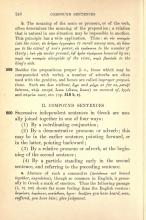597. All Prepositions were once adverbs; Homer uses them as such freely, the Attic poets occasionally; in Attic prose πρός alone is so used (cp. § 437.a). But their special office, along with their use in composition (§§ 437, 440.a), is to connect nouns or pronouns with other words, making the relation plainer than the case ending would alone.
a. The details of the use and meaning of prepositions are best learned from reading, and from vocabularies and the dictionary; some of the chief distinctions only are given here.
598. Ἀνά, εἰς or ἐς (and ὡς) take the accusative. Ἐν and σύν take the dative only. Ἀντί, ἀπό, ἐξ, and πρό take the genitive only. Διά, κατά, μετά, ὑπέρ take the accusative and genitive. Ἀμφί, ἐπί, παρα, περί, πρός, ὑπό take the accusative,genitive, and dative.
a. A preposition joined to a verb may affect the case of a noun or pronoun precisely as if it were not in composition.
b. The meaning of the noun or pronoun, or of the verb, often determines the meaning of the preposition; a relation that is natural in one situation may be impossible in another. This principle has a wide application.
εἰς τὸν ποταμόν
into the river
εἰς ἄνδρας ἐγγράφειν
to enroll among men
εἰς δύναμιν
to the extent of oneʼs power
εἰς τριᾱ́κοντα
to the number of thirty
ὑπὸ γῆς
under ground
ὑφʼ ἡμῶν τῑμώμενος
honored by us
παρὰ τὸν ποταμόν
alongside of the river
παρὰ βασιλέᾱ
to the kingʼs side
599. Besides the prepositions proper (i. e., those which may be compounded with verbs), a number of adverbs are often used with the genitive, and hence are called improper prepositions. Such are ἄνευ (without); ἄχρι and μέχρι (as far as); μεταξύ (between); πλήν (except); ἕνεκα, εἵνεκα, ἕνεκεν (on account of); ἐγγύς and πλησίον (near), etc. (cp. § 518.b & c).


